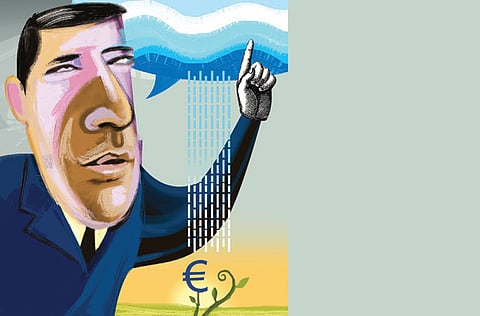For Europe, the good news needs to last
Short-term upticks will not benefit the millions of lives upended by crisis

Summer may be drawing to a close but, for the Eurozone’s economy, spring has only just begun. After 18 months in recession, the single currency bloc finally posted some much-needed growth in the form of a 0.3 per cent expansion of GDP for the second quarter.
Brussels was quick to take the credit, claiming its policies of structural reforms had finally started to take hold, whilst the investor community cautioned more work would be needed to ensure the nascent recovery could be sustained. The truth is that, yes, things are looking up, but it depends where you are in Europe and there’s certainly little room for complacency. Predictably, growth in the Eurozone’s two biggest economies Germany and France underpinned the region’s revival.
But a closer look at individual countries further down the pecking order throws up some unexpected surprises:
* Portugal, a nation whose profligacy and lack of competitiveness led to it being bailed out, grew 1.1 per cent while the Netherlands, famous for its fiscal prudence, shrank 0.2 per cent — its fourth straight quarter of contraction.
* The economies of Italy and Spain remained stuck in reverse gear as well. So much for the stereotypes and the hard and fast crisis response rules which have taken endless EU summits to draft.
Reading the data, one would be forgiven for thinking three years of austerity never happened. In fact it wasn’t even mentioned once in the communique of Olli Rehn, Vice-President of the European Commission and member of the commission responsible for economic and monetary affairs and the Euro. And yet the challenge for Europe’s leaders at a time when some of them are coming up for re-lection will be to seize upon the green shoots without dropping the ball on spending cuts.
In Germany, which will face a general election next month, business groups are already lobbying any incoming government to boost investment spending. And in France, large firms are still loath to hire due to the government’s lack of fiscal clarity and President Francois Hollande’s new punitive tax regime.
As the CEO of one FTSE 100 business with over 60,000 staff across the EU told me, “Europe is in recovery and that presents opportunities but what we need now is confidence to made sure the upswing really takes hold.”
However, as any business leader will also tell you, confidence is an intangible currency. Indeed, the next challenge for Europe’s top brass will be to convince companies that the future is bright enough to start hiring again.
Across the Eurozone, and the broader EU as a whole, firms have been amassing huge cash reserves which, in the face of uncertainty, have been neither spent on new machinery nor on the hiring of new staff.
Such businesses will need more evidence of a true lift than a mere quarter of expansion before they are to undertake any hefty capital expenditure.
The Eurozone crisis has dominated the political and economic sphere for more than three years. During that time, millions have lost their jobs creating a legacy of high unemployment and long-term underemployment which will take years to tackle.
With more than a quarter of their populations out of work today, countries like Spain and Greece will probably still be finding solutions to their jobs crisis by the time the next recession rolls around.
That’s not counting a whole generation who missed its first step on the job ladder. If Europe has really learned its lesson, business and government should start setting the wheels in motion now to work together to retrain staff for the jobs available today and tomorrow.
More jobs would boost domestic consumption and help provide a counterweight to export-dependency of the growth generators like Germany. But, to hire, businesses need to be offered incentives. One incentive is a stable, more robust economy; another is a benign interest rate environment, which is why what would really give this recovery legs is a rate cut by the end of this year. Mario Draghi, take note!
CREDIT: The writer anchors a business news programme on CNN.



